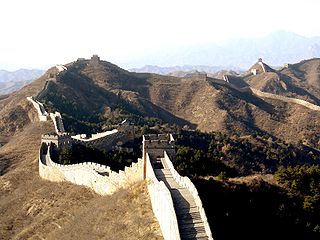The Province of Wu
'Gung Sun Dsia beat upon his sword, rose up and said: “I am the Duke’s Captain General. In the South I besieged the city of Namarat, in the West I conquered the bandits of Dsin, in the North I captured the army of Yan. I alone am worthy of leading his armies.”'
-Loshan Zu, Imperial Record Keeper
The Province of Wu is a harsh place. Furthest from the Imperial Capital, it has long suffered from being out of sight, out of mind and from the never ending raids by the horselords of the North. The windswept land of Wu is afflicted by frequent droughts, and the imperial tax collectors are particularly unforgiving; difficult years often lead to the peasantry turning to banditry just to survive.
The People of Wu
The people of Wu are the hardiest in the Empire. The weak soil makes the vast majority of peasants poorer than in the rest of the Empire. Many sons and daughters choose to join the Imperial Army rather than attempt to make a living off the land. Those who can't often turn to banditry to survive.
Citizens of Wu are more often than not armed, as life can be cut brutally short for the unprepared traveler. Imperial Soldiers from Wu are renowned for their ferocity and tenacity, though poorly organised.
Bandits in Wu are often poorly equipped, wielding arms and armor looted from or discarded by the Imperial Army. The vast majority wear their band's colours prominently, and fighting between bandit clans is not unheard of.
Places of Interest
The Carmine Citadel
The palace of the Duke of Wu sprawls astride the Great North Wall like a great blood-colored beast. The Citadel is at once the most fortified location in the Empire and its greatest military school. Its walls are adorned with the corpses of bandits and raiders captured by the forces of Wu.
As one descends its cavernous basements, the walls become increasingly hot and eventually begin to glow. It is said that a Dragon is trapped beneath the Citadel, and that to release it would spell the end of the Empire.
The Vermillion Cliff
Site of the Empire's most storied battle, where the armies of Song Gi crushed the vastly more numerous combined forces of the northern barbarians and the Golden Chou rebels. Song Gi drove back the invaders and crushed the rebels, finally uniting the three provinces into a single Empire. The base of the cliff is still dyed red by the blood of the countless soldiers who fell to their deaths, and at nights their restless ghosts are said to wander and visit ill fortune on anyone foolish enough to linger.
The Great North Wall
 Its construction was begun by the first Emperor of Chi'in, and declared finished by his great grandson eleven times removed. The Great North Wall forms the northern border of the Empire. Since its construction, legions of the Empire's finest soldiers have manned its length and kept the Empire safe from the rampaging northern hordes.
Its construction was begun by the first Emperor of Chi'in, and declared finished by his great grandson eleven times removed. The Great North Wall forms the northern border of the Empire. Since its construction, legions of the Empire's finest soldiers have manned its length and kept the Empire safe from the rampaging northern hordes.
Notable Names
Meng the Monstrous, Duke of Wu
The current Duke of Wu, Meng the Monstrous, is the bloodiest man in the Empire. Legend has it that the blood of ogres flows through his veins. He has waged an interminable campaign on the bandits that infest his Province, and the corpses of his enemies adorn the walls of the Carmine Citadel.
General Fang
General Fang is the current Imperial Overseer of the Great North Wall, responsible for the protection of the Empire from the northern hordes. An honest, dedicated man, he dreads their recent banding, but his frequent pleas for more men have so far been rebuffed by the Emperor.
'Silent' An Jia
Silent An is a name whispered in hushed tones throughout the Province of Wu. A bandit warlord who has been a thorn in the side of the Duke of Wu and the Imperial tax collectors for years. Many a household has Silent An to thank for surviving a poor harvest, and will risk the ire of the Empire to keep her and her band of thieves safe.

